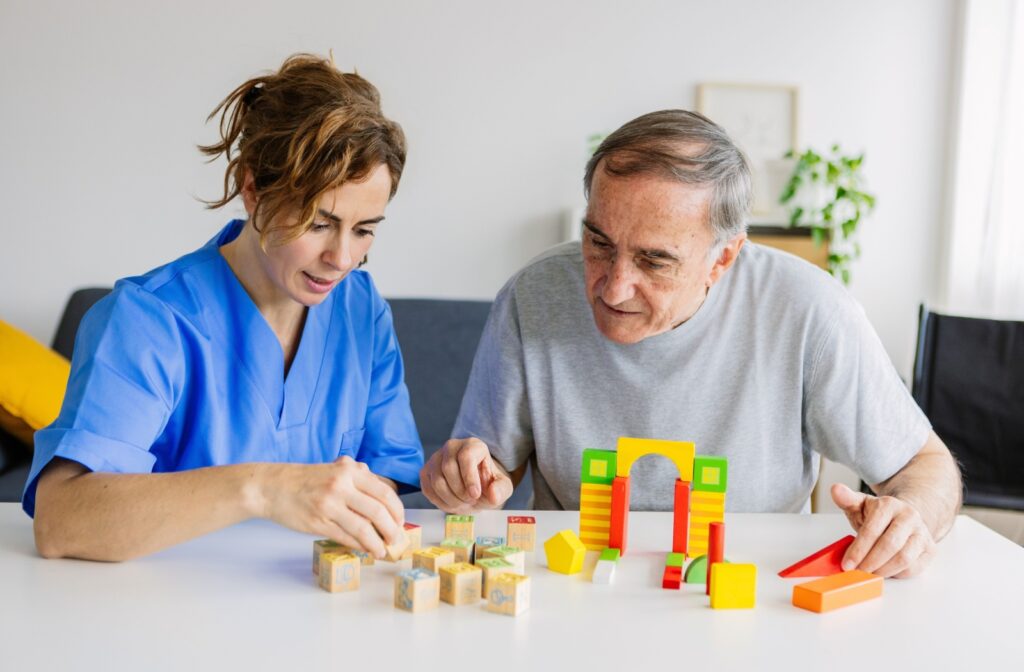Dementia is a general term that refers to symptoms that affect memory, thinking, and daily functioning, often progressing over time. While dementia is most commonly diagnosed after age 65, it can develop as early as your 30s or 40s, depending on various factors. For families and caregivers, understanding dementia’s onset and progression is important for providing the right care and support.
What Is Dementia?
Dementia is not one disease but a general term for a decline in thinking and problem-solving, significant enough to interfere with daily life.
It is caused by damage to brain cells and is often progressive, meaning symptoms worsen over time. Conditions like Alzheimer’s disease, vascular dementia, and frontotemporal dementia fall under this umbrella.
While age is a main risk factor for dementia, it’s important to recognize that dementia is not a natural part of aging.
Additionally, younger people can develop it, too. Early detection can be beneficial in helping manage the condition.
Symptoms of Dementia
Common symptoms of dementia include:
- Memory loss, which is usually noticed by someone else
- Problems with communication and reasoning
- Confusion and disorientation
- Depression and anxiety
- Personality changes
Types of Dementia
Understanding some of the more common types can help dictate your approach to diagnosis and care. Here are some common types of dementia.
Alzheimer’s Disease
Alzheimer’s is the most common form of dementia, accounting for most of the reported cases. It is known for progressive memory loss, confusion, and difficulty with reasoning or communicating.
Vascular Dementia
This form of dementia is generally caused by reduced blood flow to the brain, typically due to strokes or other blood vessel damage. Symptoms can include impaired judgement, difficulty concentrating, and slowed thinking.
Lewy Body Dementia (LBD)
LBD is associated with abnormal deposits of a protein called alpha-synuclein in the brain. It typically causes visual hallucinations, sleep disturbance, a decline in motor skills, and other cognitive impairments.
Frontotemporal Dementia (FTD)
FTD primarily affects the frontal and temporal lobes of the brain, leading to behavioral and personality changes, language difficulties, and in some cases, motor decline.
Mixed Dementia
Mixed dimension typically refers to a combination of two or more types, such as Alzheimer’s disease and vascular dementia. The symptoms may vary based on the conditions involved.
Parkinson’s Disease Dementia
Those with Parkinson’s disease may develop dementia later in the course of their illness. Symptoms often overlap with LBD and include memory issues, confusion, and difficulty with maintaining focus.
Early-Onset Dementia (Younger than 65)
Causes & Risk Factors
When dementia occurs before age 65, it’s referred to as early-onset dementia. Though less common, there are many cases that exist today. Here are some factors that might influence your chances of developing the condition:
- Genetic mutations: Some cases of early-onset dementia are hereditary, meaning they are linked to genes passed down through generations. Having family members with dementia can increase your risk, but this doesn’t mean you’ll develop it.
- Head trauma: People with a history of repeated concussions may be more likely to develop dementia earlier in life.
- Lifestyle and health concerns: Untreated high blood pressure, diabetes, and habits like smoking are known to increase the chances of dementia.
Typical Symptoms
Early-onset dementia often presents challenges that can be mistaken for stress, depression, or other conditions. Here are some common early signs to watch out for:
- Difficulty concentrating on tasks or work
- Repeatedly forgetting dates or appointments
- Struggling with vocabulary or finding the right words during conversations
- Behavioural changes, such as mood swings or withdrawal
If you or a loved one notice any of these symptoms, it is recommended to seek a professional opinion and discuss any concerns you might be having.
Dementia Diagnosed (After 65)
Most dementia cases are diagnosed after 65, as the risk increases with aging. About 1 in 9 adults over the age of 65 has Alzheimer’s disease.
Why Age Matters
Over time, the brain will naturally undergo some changes, including:
- Natural shrinkage and loss of neurons
- Reduced blood flow to the brain
- Accumulation of proteins (e.g. amyloid plaques linked to Alzheimer’s)
These factors can lead to the development of dementia in older adults. However, a thorough diagnosis should also consider lifestyle choices, environment, and health history.
While aging can increase your risk, dementia is not a normal part of aging. It’s important to consult a professional if your loved one is exhibiting symptoms of dementia that interfere with daily life.
Support Strategies for Seniors
For older adults with dementia, it can be important to establish a routine and foster a supportive environment that sustains their independence and dignity. Here are some tips to help:
- Establish routines to introduce structure and help reduce confusion
- Usie memory aids like calendars and labelling items
- Encourage physical activity and cognitive stimulation throughout the day
- Encourage regular health check-ups with a medical professional
How Lifespark Senior Living Supports Families
At Fremont Village Senior Living, we understand that every dementia case is unique and can start at various ages. That’s why we personalize our care to fit each individual’s lifestyle and preferences.
Our memory care services focus on creating a secure and comforting environment for our residents to thrive. Want to learn more? Contact us today and schedule a tour.



